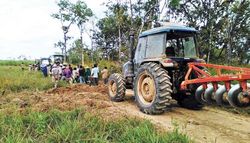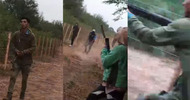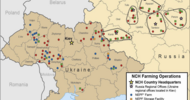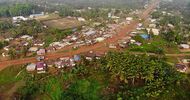
Some 100 farmers who have spent the past 11 days sleeping on land to guard it from bulldozers in Preah Vihear province are exhausted by empty promises from the government to solve their problem.
About 300 km away, in an office on the 15th floor of Phnom Penh Tower, an adviser to Rui Feng, part of a group of linked Chinese firms that plans to turn the area into a sprawling, $360 million sugarcane plantation, said he was feeling much the same way.
“We have struggled with the local people,” Wang Chen said on Wednesday. “The government in Preah Vihear didn’t talk to them. I don’t know why.”
When Rui Feng and its four sister companies were first considering a Cambodia investment 10 years ago, it was an imperfect but plausible scheme, he said.
“If we wanted to build a modern sugar factory—to compete with Thailand, India—we’d need 40,000 to 60,000 hectares. If the productivity of the land is less, then there needs to be more land,” he said.
Cambodia was not the perfect place for the investment. Electricity is expensive, Mr. Chen said—so much so that the company built its own biogas power plant to power its operations. The logistics of the remote site cause perennial difficulty, with unreliable transportation and shoddy roads.
But the government encouraged their investment and offered them land, he said. And it still does. “If we want more land, they will support us,” he said.
With this encouragement, the five partner companies—run by friends from southern China—decided to take the jump, Mr. Chen said.
Filing for five separate economic land concessions (ELCs) to avoid the legal limit of 10,000 hectares, the companies managed to get 40,000 hectares in Preah Vihear province in 2010. They brought in state-of-the-art machinery—threshers, harvesters—to mechanize the process.
Rui Feng started to clear a stretch of land along National Road 64 in Stung Treng province that stretches as far as the eye can see, and to lay the foundations for a factory to process all the sugarcane being seeded there.
It was in 2013 that locals from all over the area started to demonstrate.
They said that Rui Feng was clearing their ancestral rice land. They slept nights in corners of the concession and nearby fields to prevent them from being cleared. They confronted tractors. They appealed to local rights groups Licadho and Adhoc, and to provincial authorities.
Rui Feng did the same.
“We cultivate peaceful relationships,” Mr. Chen said. “We do not use force. We always ask the government and the police to help us.”
Those on both sides agree that authorities in Preah Vihear, after years of promising to resolve the disputes, have achieved next to nothing.
Poek Sophorn, of the NGO Ponlok Khmer, said authorities were failing both parties.
“They make excuses, and make promises in one way. Then they come again and make excuses and make promises in another way,” he said.
Little has changed since the first demonstrations of 2013. On January 1, hundreds of villagers in three communes began to sleep out in fields as tractors from Rui Feng tried to clear forests and the fields. They have surrounded and sent back 14 tractors so far.
They have met with provincial authorities twice. With almost all their land gone, they said they had little choice but to sleep on what remained.
Mr. Chen acknowledged the standoff yesterday, but said the accusations leveled at Rui Feng were unfair.
“‘You are a foreigner coming to steal my land!’ This is a concept that will not change,” Mr. Chen said. “Their thinking is that all land belongs to them.”
Rui Feng leased the land from the government, and the government had failed to tell them about the situation they were buying into, he said.
Mr. Sophorn, of Ponlok Khmer, said the government had initially leased the villagers’ land to the company, but then promised to give some back to the people living on it.
“We’ve seen their maps. The government has drawn it so the rice land of people in three districts is the company’s,” he said.
The fault wasn’t entirely the government’s, he added. Rui Feng was ostensibly required to do an environmental and social impact assessment evaluating how their investment would affect the local population.
“The government and the company joined together to violate human rights,” he said.
Some blame the locals for the failure to find a solution. Poeung Tryda, director of the provincial agriculture department, said their greed was causing the impasse.
“We have cut off some land from the concession, but some people have still demanded more land that belongs to the company,” he said.
Despite the current frustrations, Mr. Chen remains optimistic. With plenty of experience in the agriculture industry, he said, he isn’t looking to turn a profit in five or even 10 years.
“We must think about 40 years,” he said, adding that profits would depend on the economic development of Cambodia.
Though the government has implied that the companies could have more land, Mr. Chen said he advised his bosses not to accept the offer.
“We’ll ask local people to plant sugar on their land,” he said—a far less efficient way to produce cane for their factory, but better than dealing with more disputes.
“I think people will finally understand that the company is here to help them,” he said.
According to rice farmer Hut Maly, she and fellow villagers would continue protesting as long as Rui Feng kept trying to clear their land.
“We will stay until the rains fall if there is no solution,” she said.













